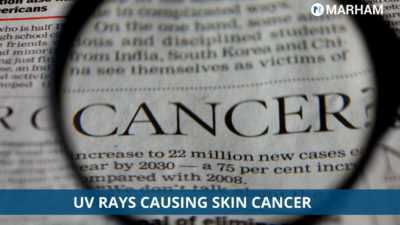UV (ultraviolet) light is a type of light. UV rays, as well as other types of rays, are present in sunlight. UV rays are emitted by some light bulbs. And also UV light bulbs are used in tanning machines, nail dryers, dermatologists’ machines, and other devices. But here we will discuss how does Ultraviolet Radiation cause Skin Cancer. So don’t go anywhere; Stay here and read;


Types of UV rays
UV rays come in a variety of shapes and sizes. UV rays are divided into three categories:
- UVA. UVA rays penetrate the skin deeper than UVB rays. These play a significant role in skin wrinkling and ageing. They also aid in the progression of skin cancer.
- UVB. Sunburn is caused primarily by these rays. They have a tendency to harm the skin’s outer layers. These rays are important in the progression of skin cancer.
- UVC. Our skin is not exposed to these rays. UVC rays are absorbed by the Earth’s atmosphere before they reach the surface.
How UV rays affect the skin?
UV rays usually react with melanin, a chemical found in the skin. The first line of defence against the sun is this. Melanin absorbs UV rays, which can cause serious skin damage. However, melanin alone cannot absorb all UV rays, and some people have very little melanin in their skin. Ultraviolet Radiation cause Skin Cancer and its exposure has been linked to a variety of health problems, including:
- Get a sunburn. When the amount of UV rays reaching the skin exceeds the amount of protection that the skin’s melanin can provide, a sunburn occurs. Sunburn causes skin damage. It causes pain, redness, and blistering.
- Skin ageing before its time. Photoaging is the term for premature skin ageing. Over time, it causes the skin to thicken and become leathery. Freckles, wrinkling, collagen loss, and the widening of small blood vessels in the skin are all signs of photoaging. People who sit in the sun on a regular basis may experience these changes earlier and more quickly.


- In later years, the skin may develop brown spots (liver spots). Every year, millions of people in the United States are diagnosed with skin cancer. As people get older, skin cancer becomes more common. However, sun damage to the skin begins at a young age. To prevent skin cancer later in life, protection should begin in childhood.
- Cataracts and other vision issues Exposure to ultraviolet radiation raises the risk of cataracts. The lens of the eye becomes cloudy in this condition, making it difficult to see. Cataracts can lead to blindness if left untreated. It’s also possible that other changes will impair vision. Consult our best dermatologist to know more.
What is the UV Index, and what does it mean?
The UV Index is a National Weather Service official forecast. It calculates the amount of ultraviolet radiation that will reach the Earth’s surface for most ZIP codes in the United States. This data can assist you in planning outdoor events and determining your level of sun exposure. It also includes advice on how to avoid sunburns. The UV Index takes into account the impact of cloud cover on the UV level forecast. On a scale of 0 (low) to 11+, it rates the risk of overexposure to UV rays from the sun (extreme). The World Health Organization (WHO) uses a color-coded system to represent UVI levels.


Final Notes
A small amount of sunlight exposure is sufficient for many people. However, too much of a good thing can be dangerous. Keep a close eye on the UV Index. Clothing and sunscreen can help to protect your skin. Take extra precautions when dealing with sand, water, or snow. All of them reflect UV rays, allowing you to get more exposure. These steps will help you reduce your chances of developing cancer, premature skin ageing, and other negative consequences. Consult our best dermatologist to know more.
Book an appointment now, to answer all your queries. You can book an appointment with the top dermatologists in Pakistan through Marham by calling at Marham helpline: 0311-1222398 or by online booking facility through the website or Marham mobile app.
Can’t Find The App?
Android Users:
https://play.google.com/store/apps/details?id=controllers.marham.marhammed&hl=en
Drop a review for us at Playstore if you’ve had a good experience!
iPhone Users:
https://apps.apple.com/pk/app/marham-find-a-doctor/id1095243102
Stay Home. Stay Safe!
FAQ’s
Is it true that ultraviolet light causes skin cancer?
The main etiologic agent in the development of skin cancers is ultraviolet radiation (UVR). UVR damages DNA and causes genetic mutations, which can lead to skin cancer.
Is it possible for radiation to cause skin cancer?
Anyone who has had radiation treatments in that area is more likely to develop skin cancer. Because skin cancer often takes many years to manifest, sun protection is a must throughout one’s life. Visit Prevent skin cancer to learn how to protect your skin.
What effect does radiation have on the skin?
The skin on the part of your body receiving radiation may become dry and peel, itch (called pruritus), and turn red or darker as a result of the treatment. Your skin may appear sunburned, swollen, or puffy. It’s possible that you’ll develop sores that are painful, wet, and infected. A moist reaction is what it’s called.
How is skin treated with radiation?
Wash skin gently with warm water* and mild soap (such as Dove) once a day and pat dry. On the skin where your radiation is given, do not use any lotions, creams, perfumes, powders, cosmetics, tape, or deodorants. The treated area should not be rubbed or massaged. To avoid irritation, dress loosely in cotton fibres.

